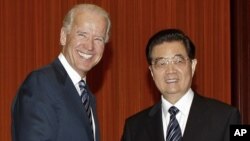Chinese leaders are expressing confidence in the debt-ridden U.S. economy, an issue that is significant because Beijing is Washington’s largest foreign creditor.
Economic issues topped the U.S.-China agenda Friday. Chinese Premier Wen Jiabao said China has full confidence that the United States will overcome its economic difficulties.
His comments came in a meeting with visiting Vice President Joe Biden, who also met with Chinese President Hu Jintao.
The Chinese message was echoed earlier in the day by Chinese Vice President Xi Jinping, who also gave his upbeat assessment of the resilience of the American economy.
|
WHO WASHINGTON OWES
|
China is the United States’ largest foreign creditor, with more than $1 trillion worth of dollar-denominated holdings.
Xi and his American counterpart, Joe Biden, presided over a meeting of business leaders from both countries. The Chinese leader said China is taking steps to ensure its own economic health.
Xi says China will ensure that its macro-economic policy is more targeted, more flexible and better able to meet future demands. He says Beijing is confident and capable of maintaining the stable and fast growth of the national economy, and hopes to avoid what he described as a “hard landing.”
At the meeting, the head of the Bank of China, Li Lihui says he is concerned about the U.S. debt crisis, but expects Washington to deal with it.
Biden encouraged Chinese businesses to continue investing in the United States.
“One other point we’ll get to discuss today, I hope we will discuss, is that we welcome, President Obama and I, we welcome, encourage and see nothing but positive benefits flowing from direct investment in the United States from Chinese businesses and Chinese entities. It means jobs, it means American jobs,” Biden said.
An article in one of China's main English language newspapers, the China Daily, quoted finance experts urging China to reduce its holdings of U.S. Treasury bonds despite Biden's reassurances.
One concrete result of Friday's meeting is that U.S. and Chinese companies signed nearly $1 billion worth of commercial deals, involving increased U.S. exports or more investment in the United States.
The U.S. Vice President travels Saturday to the southwestern city of Chengdu. While there, he will deliver a speech on U.S.-China relations at Sichuan University and, with Chinese Vice President Xi, visit nearby areas devastated by a 2008 earthquake.
From China, Biden heads to Mongolia on Monday, and then to Japan.




